Laogai Museum facts for kids
The Laogai Museum was a special museum located in Dupont Circle, Washington, D.C., in the United States. It was created to teach people about human rights in the People's Republic of China. The museum focused on a system called Láogǎi, which means "Reform through Labor" in Chinese. This was a system of prisons and labor camps.
The museum was started by Harry Wu, a famous Chinese activist. He had spent 19 years in laogai prisons himself. The museum opened on November 12, 2008. It was supported by the Yahoo! Human Rights Fund. Harry Wu's group, the Laogai Research Foundation, said it was the first museum in the U.S. to focus on human rights in China. The museum is now permanently closed.
Contents
Understanding the Laogai System
The Chinese prison system has different parts. These include prisons, labor camps, and special facilities for mental health. The Laogai Museum mainly focused on the laogai part. Harry Wu's group described laogai as a very large system of forced labor camps.
What Happened in Laogai Camps?
People held in these camps were made to do forced labor. They also went through "thought reform." This means they were taught to change their way of thinking. Many countries around the world criticized this system. In 1994, the Chinese government stopped using the name laogai. They started calling these places "prisons." However, groups like the Laogai Research Foundation believed that forced labor continued. They also said that conditions in the prisons did not get better.
Why the Museum Was Important
Harry Wu wanted the Laogai Museum to do two main things. First, he wanted to teach people about the laogai system. Second, he wanted to remember the people who suffered there. The museum showed the history and structure of laogai. It displayed items like prison uniforms and photographs. It also showed government documents.
The museum had products made by prisoners. These included things like Christmas lights, tea bags, and plastic flowers. Many of these items were given by people who had been in laogai camps. Others came from Harry Wu's own collection. The museum also kept many records. These included stories from victims and Chinese government papers.
The museum seemed to close in early 2017. This was after Harry Wu passed away in April 2016. However, the museum reopened in October 2018. It is now permanently closed.
How the Museum Was Funded
The Laogai Museum received some money from the Yahoo! Human Rights Fund. This fund was set up by the company Yahoo!. Yahoo! had faced criticism for helping Chinese police find and arrest internet activists. The fund was part of Yahoo!'s apology. It was led by Yahoo! co-founder Jerry Yang. Helping to fund the Laogai Museum was one of the fund's first public projects.
 | Victor J. Glover |
 | Yvonne Cagle |
 | Jeanette Epps |
 | Bernard A. Harris Jr. |


